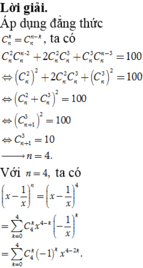Hãy nhập câu hỏi của bạn vào đây, nếu là tài khoản VIP, bạn sẽ được ưu tiên trả lời.

\(\left(1+x\right)^n=\sum\limits^n_{k=0}C_n^kx^k\)
Hệ số của 2 số hạng liên tiếp là \(C_n^k\) và \(C_n^{k+1}\)
\(\Rightarrow7C_n^k=5C_n^{k+1}\Leftrightarrow\frac{7n!}{k!.\left(n-k\right)!}=\frac{5n!}{\left(k+1\right)!\left(n-k-1\right)!}\)
\(\Leftrightarrow\frac{7}{n-k}=\frac{5}{k+1}\Leftrightarrow7k+7=5n-5k\)
\(\Leftrightarrow5n=12k+7\Rightarrow n=\frac{12k+7}{5}\)
\(\Rightarrow n_{min}=11\) khi \(k=4\)
2/ \(\left(x-2\right)^{100}=\sum\limits^{100}_{k=0}C_{100}^kx^k.\left(-2\right)^{100-k}\)
\(a_{97}\) là hệ số của \(x^{97}\Rightarrow k=97\)
Hệ số là \(C_{100}^{97}.\left(-2\right)^3\)

a) <=> \(\frac{4^x}{5^{x^2}}=1\) <=> \(4^x=5^{x^2}\Leftrightarrow log4^x=log5^{x^2}\) <=> x.log4 = x2.log5 <=> x2. log 5 - x log4 = 0 <=> x. (x.log5 - log 4) = 0
<=> x = 0 hoặc x.log5 - log 4 = 0
x.log5 - log 4 = 0 <=> x = log4/log5 = \(log_54\)
b) \(\frac{5.2^{\frac{x}{2}}.3^{\frac{x}{2}}}{3^x}-\frac{4.3^x}{3^x}+\frac{9.2^x}{3^x}=0\)
<=> \(5.\left(\frac{2}{3}\right)^{\frac{x}{2}}-4+9.\left(\frac{2}{3}\right)^x=0\)
Đặt \(t=\left(\frac{2}{3}\right)^{\frac{x}{2}}\) ( t > 0) . Phương trình trở thành: 9t2 + 5t - 4 = 0 <=> t = -1 (Loại) hoặc t = 4/9 ( Thỏa mãn)
t = 4/9 => \(\left(\frac{2}{3}\right)^{\frac{x}{2}}=\frac{4}{9}=\left(\frac{2}{3}\right)^2\) <=> x/2 = 2 <=> x = 4
c) <=> \(\frac{3.8^x}{8^x}+\frac{4.12^x}{8^x}=\frac{18^x}{8^x}+\frac{2.27^x}{8^x}\)
<=> \(3+4.\left(\frac{3}{2}\right)^x=\left(\frac{3}{2}\right)^{2x}+2.\left(\frac{3}{2}\right)^{3x}\)
Đặt \(t=\left(\frac{3}{2}\right)^x\) ( t > 0) . Phương trình trở thành: 3 + 4t = t2 + 2t3
<=> 2t3 + t2 - 4t - 3 = 0 <=> (t +1)2. ( t - 3/2) = 0 <=> t = -1 ( Loại) hoặc t = 3/2 ( Thỏa mãn)
t = 3/2 => \(\left(\frac{3}{2}\right)^x=\frac{3}{2}\) <=> x = 1

Giải:
\(A=\dfrac{9}{1.2}+\dfrac{9}{2.3}+\dfrac{9}{3.4}+...+\dfrac{9}{98.99}+\dfrac{9}{99.100}\)
\(A=9.\left(\dfrac{1}{1.2}+\dfrac{1}{2.3}+...+\dfrac{1}{98.99}+\dfrac{1}{99.100}\right)\)
\(A=9.\left(1-\dfrac{1}{2}+\dfrac{1}{2}-\dfrac{1}{3}+\dfrac{1}{3}-\dfrac{1}{4}+....+\dfrac{1}{99}-\dfrac{1}{100}\right)\)
\(A=9.\left(1-\dfrac{1}{100}\right)\)
\(A=9.\dfrac{99}{100}\)
\(A=\dfrac{891}{100}\)

\(P=loga^3+logb^2=log\left(a^3b^2\right)=log\left(100\right)=10\)

\(\Leftrightarrow x+10^0=-90^0+k360^0\)
\(\Leftrightarrow x=-100^0+k360^0\)

\(a,3^{x-1}=27\\ \Leftrightarrow3^{x-1}=3^3\\ \Leftrightarrow x-1=3\\ \Leftrightarrow x=4\\ b,100^{2x^2-3}=0,1^{2x^2-18}\\ \Leftrightarrow10^{4x^2-6}=10^{-2x^2+18}\\ \Leftrightarrow4x^2-6=-2x^2+18\\ \Leftrightarrow6x^2=24\\ \Leftrightarrow x^2=4\\ \Leftrightarrow x=\pm2\)
\(c,\sqrt{3}e^{3x}=1\\ \Leftrightarrow e^{3x}=\dfrac{1}{\sqrt{3}}\\ \Leftrightarrow3x=ln\left(\dfrac{1}{\sqrt{3}}\right)\\ \Leftrightarrow x=\dfrac{1}{3}ln\left(\dfrac{1}{\sqrt{3}}\right)\)
\(d,5^x=3^{2x-1}\\ \Leftrightarrow2x-1=log_35^x\\ \Leftrightarrow2x-1-xlog_35=0\\ \Leftrightarrow x\left(2-log_35\right)=1\\ \Leftrightarrow x=\dfrac{1}{2-log_35}\)


